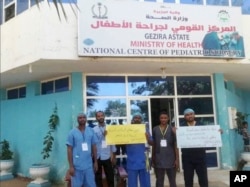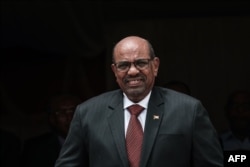Riot police fired tear gas at thousands of protesters in Sudan's capital on Sunday, as demonstrations calling for President Omar al-Bashir to step down continued for the third week.
Crowds of protesters gathered in Khartoum Sunday, heeding a call from the Sudanese Professionals' Association — a group of doctors, teachers, and engineers which have called for strikes and demonstrations over the past month.
Police responded by firing tear gas to disperse crowds. Videos posted online from anti-government activists show people fleeing down side streets and alleyways downtown to escape the noxious gas.
Sudan's government said 19 people have been killed, including two security personnel, since the protests broke out the northeastern city of Atbara on December 19.
Human rights group Amnesty International said 37 people have been killed in the protests.
Authorities have closed schools and declared curfews and states of emergency in several regions since the protests began.
Protesters have repeatedly targeted and burned the offices of Bashir's party and called for an end to his 29-year rule. Bashir came to power in a 1989 military coup.
Prices for food in Sudan have climbed sharply in recent months, with inflation topping 60 percent. This comes after the government cut subsidies earlier in 2018.
Sudan's economy deteriorated after South Sudan became independent, depriving Khartoum of much of its oil revenue. Sudan is facing a foreign exchange crisis and soaring inflation, despite the United States lifting a trade embargo in October 2017.








